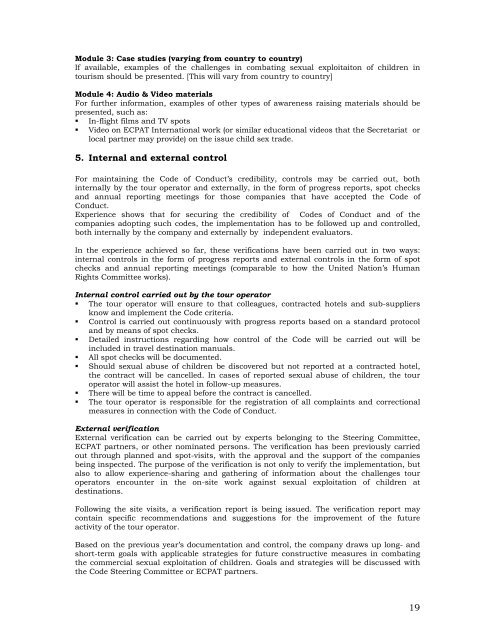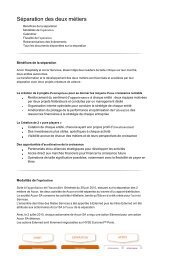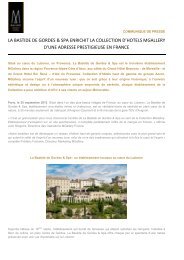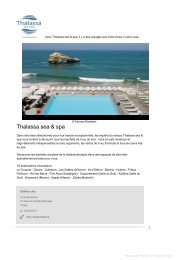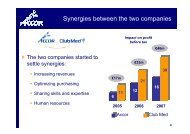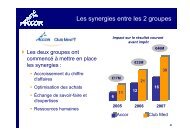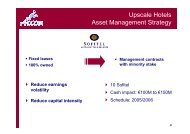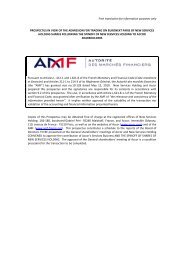Code of Conduct for the Protection of Children from Sexual ...
Code of Conduct for the Protection of Children from Sexual ...
Code of Conduct for the Protection of Children from Sexual ...
Create successful ePaper yourself
Turn your PDF publications into a flip-book with our unique Google optimized e-Paper software.
Module 3: Case studies (varying <strong>from</strong> country to country)<br />
If available, examples <strong>of</strong> <strong>the</strong> challenges in combating sexual exploitaiton <strong>of</strong> children in<br />
tourism should be presented. [This will vary <strong>from</strong> country to country]<br />
Module 4: Audio & Video materials<br />
For fur<strong>the</strong>r in<strong>for</strong>mation, examples <strong>of</strong> o<strong>the</strong>r types <strong>of</strong> awareness raising materials should be<br />
presented, such as:<br />
In-flight films and TV spots<br />
Video on ECPAT International work (or similar educational videos that <strong>the</strong> Secretariat or<br />
local partner may provide) on <strong>the</strong> issue child sex trade.<br />
5. Internal and external control<br />
For maintaining <strong>the</strong> <strong>Code</strong> <strong>of</strong> <strong>Conduct</strong>’s credibility, controls may be carried out, both<br />
internally by <strong>the</strong> tour operator and externally, in <strong>the</strong> <strong>for</strong>m <strong>of</strong> progress reports, spot checks<br />
and annual reporting meetings <strong>for</strong> those companies that have accepted <strong>the</strong> <strong>Code</strong> <strong>of</strong><br />
<strong>Conduct</strong>.<br />
Experience shows that <strong>for</strong> securing <strong>the</strong> credibility <strong>of</strong> <strong>Code</strong>s <strong>of</strong> <strong>Conduct</strong> and <strong>of</strong> <strong>the</strong><br />
companies adopting such codes, <strong>the</strong> implementation has to be followed up and controlled,<br />
both internally by <strong>the</strong> company and externally by independent evaluators.<br />
In <strong>the</strong> experience achieved so far, <strong>the</strong>se verifications have been carried out in two ways:<br />
internal controls in <strong>the</strong> <strong>for</strong>m <strong>of</strong> progress reports and external controls in <strong>the</strong> <strong>for</strong>m <strong>of</strong> spot<br />
checks and annual reporting meetings (comparable to how <strong>the</strong> United Nation’s Human<br />
Rights Committee works).<br />
Internal control carried out by <strong>the</strong> tour operator<br />
The tour operator will ensure to that colleagues, contracted hotels and sub-suppliers<br />
know and implement <strong>the</strong> <strong>Code</strong> criteria.<br />
Control is carried out continuously with progress reports based on a standard protocol<br />
and by means <strong>of</strong> spot checks.<br />
Detailed instructions regarding how control <strong>of</strong> <strong>the</strong> <strong>Code</strong> will be carried out will be<br />
included in travel destination manuals.<br />
All spot checks will be documented.<br />
Should sexual abuse <strong>of</strong> children be discovered but not reported at a contracted hotel,<br />
<strong>the</strong> contract will be cancelled. In cases <strong>of</strong> reported sexual abuse <strong>of</strong> children, <strong>the</strong> tour<br />
operator will assist <strong>the</strong> hotel in follow-up measures.<br />
There will be time to appeal be<strong>for</strong>e <strong>the</strong> contract is cancelled.<br />
The tour operator is responsible <strong>for</strong> <strong>the</strong> registration <strong>of</strong> all complaints and correctional<br />
measures in connection with <strong>the</strong> <strong>Code</strong> <strong>of</strong> <strong>Conduct</strong>.<br />
External verification<br />
External verification can be carried out by experts belonging to <strong>the</strong> Steering Committee,<br />
ECPAT partners, or o<strong>the</strong>r nominated persons. The verification has been previously carried<br />
out through planned and spot-visits, with <strong>the</strong> approval and <strong>the</strong> support <strong>of</strong> <strong>the</strong> companies<br />
being inspected. The purpose <strong>of</strong> <strong>the</strong> verification is not only to verify <strong>the</strong> implementation, but<br />
also to allow experience-sharing and ga<strong>the</strong>ring <strong>of</strong> in<strong>for</strong>mation about <strong>the</strong> challenges tour<br />
operators encounter in <strong>the</strong> on-site work against sexual exploitation <strong>of</strong> children at<br />
destinations.<br />
Following <strong>the</strong> site visits, a verification report is being issued. The verification report may<br />
contain specific recommendations and suggestions <strong>for</strong> <strong>the</strong> improvement <strong>of</strong> <strong>the</strong> future<br />
activity <strong>of</strong> <strong>the</strong> tour operator.<br />
Based on <strong>the</strong> previous year’s documentation and control, <strong>the</strong> company draws up long- and<br />
short-term goals with applicable strategies <strong>for</strong> future constructive measures in combating<br />
<strong>the</strong> commercial sexual exploitation <strong>of</strong> children. Goals and strategies will be discussed with<br />
<strong>the</strong> <strong>Code</strong> Steering Committee or ECPAT partners.<br />
19


